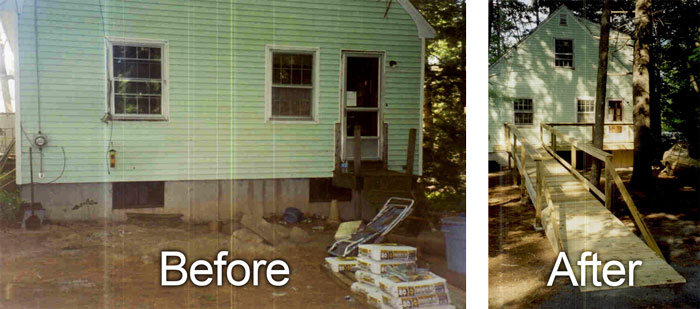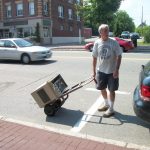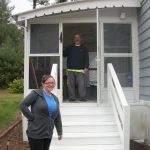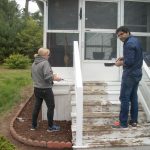CLIENT SERVICES
The population our Volunteer Care-Giving Program serves includes elderly and disabled individuals. These individuals are experiencing difficulty performing the everyday tasks that living on their own requires - including driving, grocery shopping, household chores, friendly visiting, respite, home maintenance, yard work, etc. In addition, even though many of our clients suffer from the typical difficulties experienced by older and disabled populations, - including increased frailty, difficulty seeing and hearing , isolation, etc., we also serve people with serious medical conditions, like cancer and renal failure.For all our clients, transportation to and from doctor appointments and medical treatments is critical.
Clients can receive assistance with transportation (primarily medical), friendly visiting, light chores, grocery shopping, respite and telephone reassurance. All clients are assessed in their homes to determine if services are appropriate. Background information is also obtained at this time. Due to a demand for service that outstrips our volunteer capacity, a waiting list has been instituted.
Our Units of Service have grown from 6,040 in 2007 to 15,383 in 2017,
a 15.4% annual growth rate.
This is how the program works:
 Community Caregivers takes requests from potential clients year round. If a prospective client lives within our service area and is looking for practical assistance and not medical care, we do a short intake over the phone to begin to assess their needs. If we have a volunteer available that can meet their needs, we set up a home visit to gather the information we need to enroll them as a client. If we do not have a volunteer available currently to meet their needs, they are placed on a waiting list until we find a suitable volunteer. All new clients get a copy of our Client Handbook/ Memorandum of Understanding and sign a general release, an information release, and a liability waiver to acknowledge the limits of our volunteer services.
Community Caregivers takes requests from potential clients year round. If a prospective client lives within our service area and is looking for practical assistance and not medical care, we do a short intake over the phone to begin to assess their needs. If we have a volunteer available that can meet their needs, we set up a home visit to gather the information we need to enroll them as a client. If we do not have a volunteer available currently to meet their needs, they are placed on a waiting list until we find a suitable volunteer. All new clients get a copy of our Client Handbook/ Memorandum of Understanding and sign a general release, an information release, and a liability waiver to acknowledge the limits of our volunteer services.
Once we have completed a home assessment and formally taken a person on as a client for In-Home services, we set up an introduction with the volunteer and create the match. For Transportation services we take the client's near-term appointments and set them up with drivers from their community. For the first few weeks, we follow-up with both the client and the volunteer to make sure the match/transport worked well for both parties.
How we are different:
 Most of the elderly and disabled individuals we serve are unable to drive, and they may not have family members who live nearby or neighbors they can call upon for assistance. Without our free transportation services, the cost a Derry senior would have to pay for a cab ride to a Londonderry doctor’s appointment might easily be $12-$15, no small amount for someone on a fixed income. And unlike our volunteers, a cab driver won’t walk up to the door, assist the individual with their coat, help them into the car, wait patiently while they are at their appointment, stop by the pharmacy on the way home to pick up a prescription, and see that they get safely back into their homes.
Most of the elderly and disabled individuals we serve are unable to drive, and they may not have family members who live nearby or neighbors they can call upon for assistance. Without our free transportation services, the cost a Derry senior would have to pay for a cab ride to a Londonderry doctor’s appointment might easily be $12-$15, no small amount for someone on a fixed income. And unlike our volunteers, a cab driver won’t walk up to the door, assist the individual with their coat, help them into the car, wait patiently while they are at their appointment, stop by the pharmacy on the way home to pick up a prescription, and see that they get safely back into their homes.
Our In-Home services begin with a home assessment by staff. During that visit, we assess the client’s current condition and capabilities, take down emergency contacts, and identify other potential needs (including needs we refer out, like Meals on Wheels, R.E.A.P. etc.). Since all our in-home visits are based on a one-to-one match between the same volunteer and client, our volunteers are often the first ones to identify concerning changes in behavior and physical condition that can be relayed to emergency contacts, the Bureau of Elderly and Adult Services, or Town safety and social services personnel.
Interested in becoming a potential client or referring a loved one, email susanne@comcaregivers.org or call her at 432-0877 x 2.
PROJECT UPKEEP

Sponsored by People's United Bank

Project Upkeep offers home maintenance and repair services to our clients. Trained and vetted "handyman" volunteers make small repairs and do routine maintenance to our client's homes. There is no charge for this service, although clients are asked to reimburse volunteers for the materials used in the repairs if they are financially able to.
Project Upkeep works primarily with low-income elderly and disabled community members. These individuals are having difficulty performing the everyday tasks that living on their own requires - including making small repairs and maintaining their homes and properties. They may be a widow or widower and have no family that lives nearby. They often suffer from mobility issues or have difficulty seeing. In addition, because the overwhelming majority of our clients are elderly and live alone, they are leery of dealing with strangers. Knowing that we screen, train and supervise the volunteer "handyman" we send to them allows them to use Project upkeep repair and maintenance services with peace of mind and confidence.
Individuals who seek Project Upkeep services must first become clients of our organization. Once an individual becomes a client, we take repair requests for Project Upkeep on an ongoing basis. We are often made aware of needed repairs by our volunteer drivers or the client's in-home volunteer match who notice problems while picking up or visiting the client. They may notice a burned out porch light, or a wobbly railing, or a leaky faucet, etc. Sometimes a client's difficulty seeing or mobility issues may prevent them from identifying a potentially dangerous situation. Our volunteers are trained to report situations that they feel may adversely affect a volunteer or client's safety. We then contact the client, investigate the situation and schedule the repair.
In addition to small repair projects, we also do one-on-one indoor and outdoor maintenance projects. These may include shoveling walks and stairs in the winter, mowing lawns and weeding gardens in the summer, spring and fall yard clean-ups, putting in and taking out air conditioners, removing trash, etc. We also find ourselves called upon more and more often to do major cleaning and de-cluttering projects, and we even helping clients pack up and move.
CCGD Volunteer Caregiving Program: Client Survey
Send date: Feb 2019 to 175 clients and 175 volunteers.
For the client survey: We wanted to know how CCGD has made a difference for them. Information collected will be used for program evaluation, marketing, and strategic planning. 54 responded
The last time we completed a written survey was 2010. We used to complete them yearly. It was felt as though the same questions were asked each year to generally the same respondents and not many new answers were given. The staff and Board of Directors gave great thought to asking only the questions that were unknown to us and ones that would help us gain insight. We did not ask demographic questions as we already ask those upon admission. We did not ask about other services that they desire or would be willing to help with as we established these targets in 2017 through our strategic plans community needs assessment.
We have many small goals related to the survey results. Just a few are: • How do you better engage the families of our clientele. • How do we help our clients understand the need to donate financially and that our free services come with a cost. • How do we communicate the value of our services to for-profit medical professionals. • How do we grow as a staff to better meet the program needs of our volunteers. • Where do we need to do more/less outreach.










